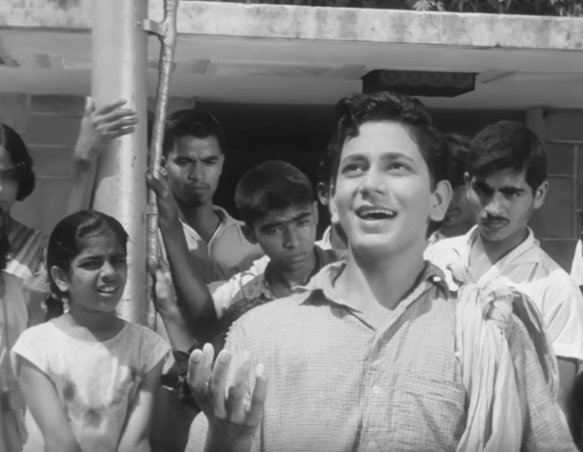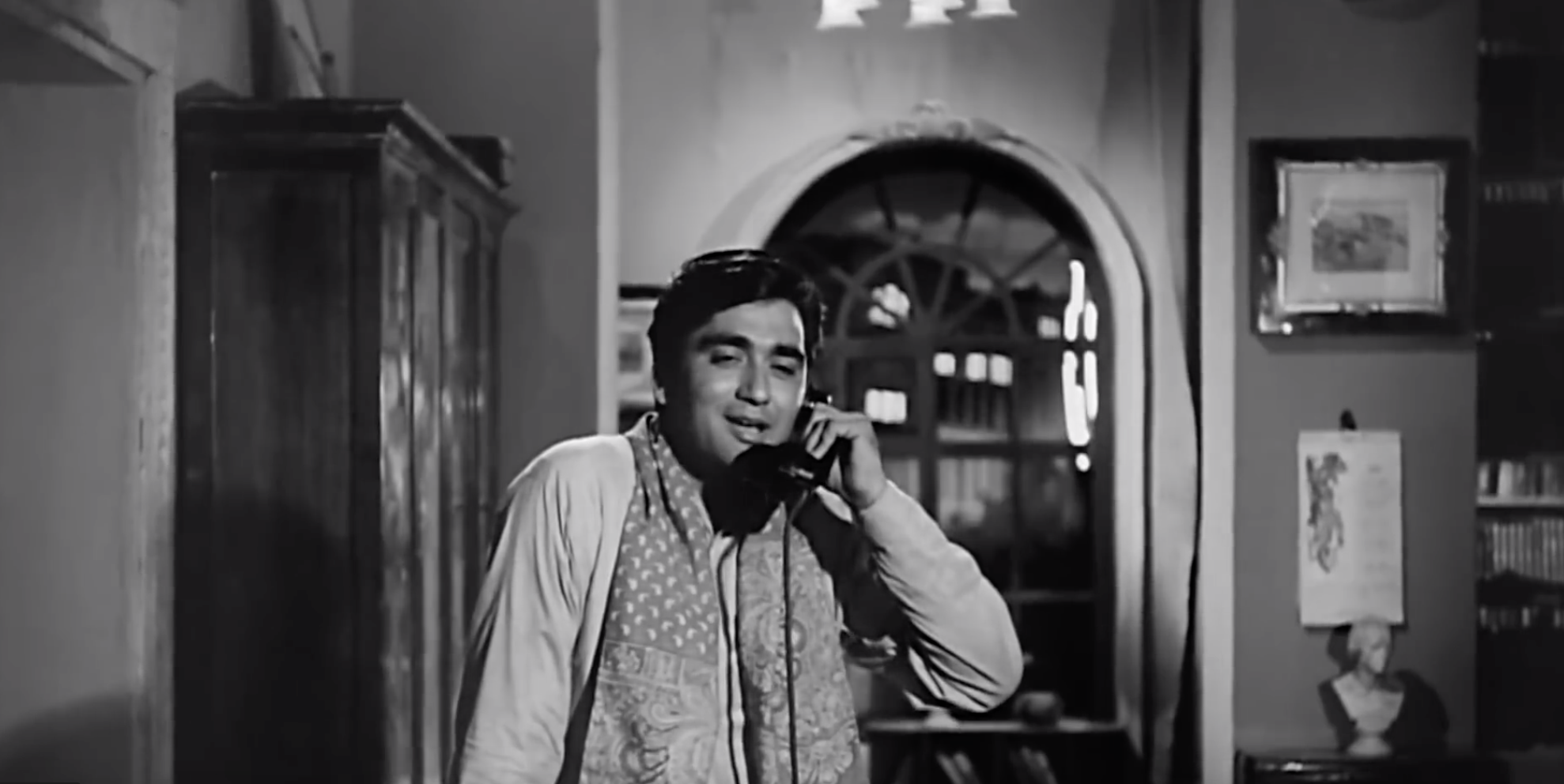
Sudhir Kumar plays a gifted blind boy with sensitivity and finesse in Dosti (1964).
Today we present the lyrics and English translation of “Janewalo Zara Mud Ke Dekho” from the poignant film Dosti (1964). A passionate plea to recognize the humanity in our neighbors and embrace others in our community, no matter their differences, “Janewalo Zara” seems like the perfect anthem for the new realities we all live in.
You may not know this, but Mr. ’55 and I are both doctors! We trained together in the same hospital after medical school and are both working on the front lines of the coronavirus pandemic this month. The coronavirus has hit us all in different ways, but it has not spared anyone–regardless of race, socioeconomic class, or religion. We truly hope all our fans are staying healthy and staying at home.
We know quarantine is far from easy. During tough times, take a moment to appreciate something you have despite the many losses we all feel. For everyone who is bored in their homes, there are people who have suddenly found themselves homeless during the shutdown. For everyone driving their spouse nuts (not speaking from personal experience, *obviously*), there are people who find themselves entirely alone and secluded all day long. For everyone who has lost their job, there are people who are scared to go to their jobs for fear of becoming infected (and I don’t just mean fellow healthcare workers, but custodians and food service workers and everyone else considered “essential”). For everyone grieving the loss of doing the things they loved, there are people grieving the loss of the people they loved, and maybe could not even visit in the hospital when ill.

Mohammed Rafi is the perfect soul stirring match to vocalize the song “Janewalo Zara” from the film Dosti (1964).
Dosti (1964) is a Bollywood bromance between two teenage boys, Ramu and Mohan, who form an unlikely friendship in a time of adversity. Ramu (Sushil Kumar) has a permanent leg injury from a childhood accident and Mohan (Sudhir Kumar) is blind. Together, they demonstrate that friendship and kindness should know no boundaries. This song, with music by Laxmikant-Pyarelal and vocals by the inimitable Mohammed Rafi, is a reminder about coming together as a community and ensuring our most vulnerable are not abandoned.
On that note, we hope you appreciate our English translation of “Janewalo Zara” below! And if you are able, reach out to and help your neighbors who may be hurting more than you know (from a safe social distance, of course!). We would love to hear what inspires you during this difficult time, and which classic Bollywood songs and films are help you stay sane!
Janewalo Zara Mud Ke Dekho Lyrics & Translation:
Jaanewaalo zaraa muD ke dekho mujhe Passerbys, turn around a little and look at me Ek insaan huu.N, mai.N tumhaarii taraah I am a human being, I am just like you Jisne sabko rachaa apne hii ruup se He who created everything in his own beauty Uskii pahchaan huu.N, mai.N tumhaarii taraah I share his identity, I am just like you Is anokhe jagat kii mai.N taqdiir huu.N I am the Fate of this strange world Mai.N vidhaataa ke haatho.N kii tasviir huu.N, ek tasviir huu.N I am the image sculpted by the Lord's own hands Is jahaa.N ke liye, dhartii maa.N ke liye For the sake of the world, for the sake of Mother Earth Shiv ka vardaan huu.N, mai.N tumhaarii taraah I am a boon from Shiva, I am just like you Man ke andhar chhipaaye milan kii lagan You have hidden the desire to meet in your mind Apne suraj se huu.N ek bichhaDii kiran, ek bichhaDii kiran I am a beam of sunlight separated from the sun Phir rahaa huu.N bhaTaktaa mai.N yahaa.N se vahaa.N I continue to wander, here and there Aur pareshaan huu.N mai.N tumhaarii taraah And I am worried, I am just like you Mere paas aao, chhoDo yeh saara bharam Come near me, leave all these misapprehensions behind Jo mera dukh vahii.N hai tumhaaraa bhii gham My sadness is the same as your sorrow Dekhtaa huu.N tumhe, jaantaa huu.N tumhe I see you, I know you Laakh anjaan huu.N, mai.N tumhaarii taraah I am an absolute stranger, but I am just like you
Glossary:
zaraa: a little; muDnaa: to turn around; insaan: human being; [kisi kii] taraah: like [someone]; rachnaa: to create; ruup: beauty; appearance; pahchaan: identity, recognition; anokhaa: strange, unique; jagat: world; taqdiir: Fate; vidhaataa: the Lord; haath: hands; tasviir: picture; jahaa.N: world; dhartii: earth; Shiv: Lord Shiva (Hindu); vardaan: boon, wish; man: mind; andhar: inside; chhipaanaa: to hide; milan: meeting; lagan: desire; suraj: sun; bichaDnaa: to become separated; kiran: ray of sunlight; bhaTaknaa: to wander; pareshaan: worry; chhoDnaa: to let go of; bharam: misapprehensions; dukh: sad; gham: sorrow; laakh: ten thousand; anjaan: stranger
Did you know Dosti won the 1964 FilmFare Award for Best Picture, and is #24 on our list of the top classic Bollywood films ever made?
Until next time, stay safe and #stayhomeIndia!

Mr. ’55 and I enjoying sunlight and a post-call brunch after working overnight in the ICU. Note: this picture was taken before restaurants transitioned to take-out only and masks were recommended at all times in public 🙂
– Mrs. ’55













